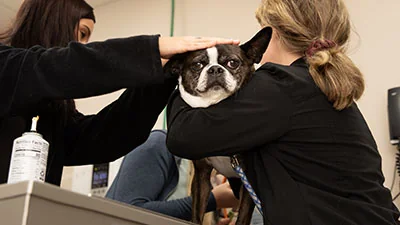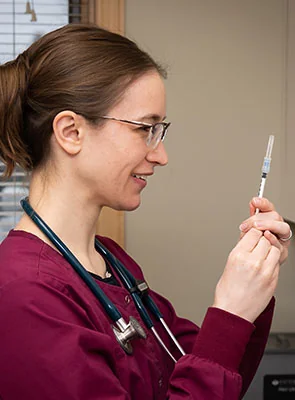Dog & Cat Vaccinations in White Bear Lake
Dog and cat vaccines are an important tool for immunizing your pet against different diseases they might encounter during their life. This can include the rabies virus, distemper, leukemia, or influenza. When we meet your new pet for the first time, we'll explain why they need vaccines, and help you figure out which ones your pet will need to stay healthy.
If you're uncertain about vaccinating your pet, our veterinarians are happy to address your concerns and guide you in making the best decision.
How Dog & Cat Vaccinations Work

Vaccines function the same way in dogs and cats as they do in humans. When given, a vaccine prompts your pet's immune system to react and produce antibodies, which destroy the vaccine's irritating antigens. This increases their overall immunity.
While vaccines are effective at preventing disease altogether and helping pets recover more quickly from infection, they do not last forever. Your pet will need to be re-vaccinated on a yearly basis to maintain healthy immunity levels.

Our Vaccines For Cats & Dogs
Vaccines we recommend for cats and dogs include:
Cats
- Rabies (recommended)
- FVRCP upper respiratory vaccine (recommended)
- Feline leukemia (recommended for at-risk/outdoor cats)
Dogs
- Rabies (recommended)
- DHPP (recommended)
- Bordetella (recommended for at-risk dogs)
- Oral vaccine given for local mucosal response
- Injectable given as booster for better immune response and full-year immunity
- Bivalent canine influenza*
- Lyme vaccine (recommended due to ticks and Lyme disease being prevalent in the area)
- Leptospirosis (recommended for at-risk dogs)
*Birch Lake Animal Hospital is one of the first animal practices in the Twin Cities to receive and use the bivalent flu vaccine, which protects dogs against the H3N2 and H3N8 flu strains. We recommend this vaccine for all dogs receiving the Bordetella vaccine.
When to Get Started on Pet Vaccinations
Pets should begin their vaccinations between six and eight weeks old, but they need to be healthy first. Their initial vaccinations will also depend on whether they have been vaccinated in the past. Knowing your pet's medical history is important, because we do not want to
over-vaccinate.
Beginning your cat or dog's vaccinations when they are young is vital, because their immune system is not yet fully developed. This leaves them vulnerable to disease, and they need "boosters" to build their immunity. If you have a new puppy or kitten and would like to get started with their vaccinations, call us today at (651) 426-2246.
